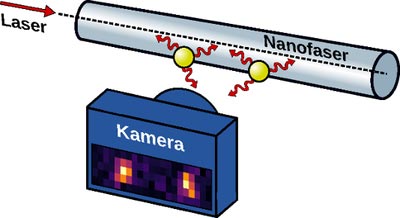Atoms at the photo shoot

Einzelne Atome (gelb) in der Nähe einer Nano-Glasfaser werden mit Hilfe einer empfindlichen Kamera fotografiert. Die Beleuchtung erfolgt mit Hilfe eines Laserstrahls. Bild: Team Rauschenbeutel
The first photograph of a single trapped atom represented a milestone for quantum research. This breakthrough was made possible because the atom was captured in a vacuum using electric fields and held far from surfaces whose scattered light could blind the camera.
Scientists at Humboldt University of Berlin (HU) and Technical University of Vienna (TU) have now succeeded for the first time in taking photos of individual atoms floating less than a thousandth of a millimeter above a light-conducting glass fiber.
This allows effects such as the absorption and emission of light to be studied in the laboratory in a much more controlled way than before. In addition, the knowledge gained will help to develop components for a new generation of optical fiber networks.
About ten years ago, Prof. Dr. Arno Rauschenbeutel's research group realized for the first time a novel atom-light interface in which several thousand atoms are trapped in the vicinity of special glass fibers.
These are so-called optical nanofibers, which are 100 times thinner than a human hair. The atoms are captured with tweezers created by laser light only 0.2 micrometers away from the glass fiber surface. At the same time, they are cooled with laser light to a temperature of about one millionth of a degree above absolute zero.
Despite these extreme conditions, the researchers have recently even been able to carry out experiments with single fiber-coupled atoms. They took photographs of the atoms and made short films of a few seconds duration (see link).
To do this, they used an ultra-sensitive camera and had to rigorously shield any ambient light. Thanks to the permanent cooling, the atoms remained so steady that the images could be exposed for almost half a second.
“Based on these results, we will be able to study the interaction of light and matter extremely precisely, atom by atom”, says Dr. Philipp Schneeweiss, a member of Rauschenbeutel’s team.
Possible applications of this research include more efficient light sources and photosensitive elements, using individual atoms as probes to study the properties of surfaces, and the optical processing of quantum information.
More Information
Listen to the HU-Podcast with Prof. Dr. Arno Rauschenbeutel „Von Licht, Atomen und Geheimdiensten“.
Dr. Philipp Schneeweiss: philipp.schneeweiss@hu-berlin.de
Prof. Dr. Arno Rauschenbeutel: arno.rauschenbeutel@hu-berlin.de
Imaging and localizing individual atoms interfaced with a nanophotonic waveguide
Y. Meng, C. Liedl, S. Pucher, A. Rauschenbeutel, P. Schneeweiss
Phys. Rev. Lett. 125, 053603 (2020)
DOI: 10.1103/PhysRevLett.125.053603
Sie finden das Paper auch unter https://journals.aps.org/prl/abstract/10.1103/PhysRevLett.125.053603
https://www.physik.hu-berlin.de/de/gop/media/atom_movie2.gif
Media Contact
All latest news from the category: Physics and Astronomy
This area deals with the fundamental laws and building blocks of nature and how they interact, the properties and the behavior of matter, and research into space and time and their structures.
innovations-report provides in-depth reports and articles on subjects such as astrophysics, laser technologies, nuclear, quantum, particle and solid-state physics, nanotechnologies, planetary research and findings (Mars, Venus) and developments related to the Hubble Telescope.
Newest articles

A universal framework for spatial biology
SpatialData is a freely accessible tool to unify and integrate data from different omics technologies accounting for spatial information, which can provide holistic insights into health and disease. Biological processes…

How complex biological processes arise
A $20 million grant from the U.S. National Science Foundation (NSF) will support the establishment and operation of the National Synthesis Center for Emergence in the Molecular and Cellular Sciences (NCEMS) at…

Airborne single-photon lidar system achieves high-resolution 3D imaging
Compact, low-power system opens doors for photon-efficient drone and satellite-based environmental monitoring and mapping. Researchers have developed a compact and lightweight single-photon airborne lidar system that can acquire high-resolution 3D…





















